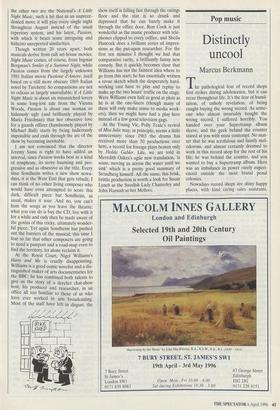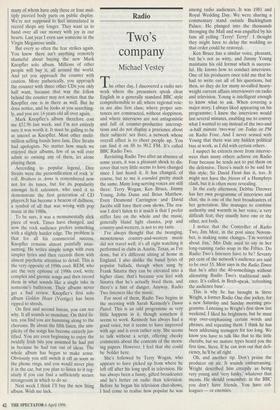Pop music
Distinctly uncool
Marcus Berkmann
The pathological fear of record shops first strikes during adolescence, but it can recur throughout life. It's the fear of humil- iation, of unholy revelation, of being caught buying the wrong record. As some- one who almost invariably bought the wrong record, I suffered horribly. You handed over your Supertramp album sleeve, and the geek behind the counter stared at you with mute contempt. No mat- ter that he was scrofulous and faintly mal- odorous, and almost certainly doomed to work in this record shop for the rest of his life; he was behind the counter, and you wanted to buy a Supertramp album. Here was an imbalance in power rarely experi- enced outside the most brutal penal colonies.
Nowadays record shops are shiny happy places, with kind caring sales assistants, many of whom have only three or four mul- tiply pierced body parts on public display. We're not supposed to feel intimidated in record shops any longer. They want us to hand over all our money with joy in our hearts. Last year I even saw someone in the Virgin Megastore smile.
But every so often the fear strikes again. You know there isn't anything remotely shameful about buying the new Mark Knopfler solo album. Millions of other people will buy it, all around the world. And yet you approach the counter with caution. More pathetically, you approach the counter with three other CDs you only half want, because that way the fellow behind the counter may not notice that the Knopfler one is in there as well. But he does notice, and he looks at you searching- ly, and you are 14 years old all over again.
Mark Knopfler's album therefore cost me £52.96 last week, and I'm not entirely sure it was worth it. It must be galling to be as uncool as Knopfler. Most other multi- million selling bands have fans. Dire Straits had apologists. No matter how much we enjoyed their albums, few of us will ever admit to owning any of them, let alone playing them.
According to popular legend, Dire Straits were the personification of rock 'n' roll. Brothers in Arms is remembered now not for its tunes, but for its popularity amongst hi-fi salesmen, who used it to demonstrate the first generation of CD players.It has become a beacon of dullness, a symbol of all that was wrong with pop music in the 1980s.
To be sure, it was a monumentally slick piece of work. Times have changed, and now the rock audience prefers something with a slightly harder edge. The problem is that for all his commercial success, Knopfler remains almost painfully unas- suming. He writes simple songs with even simpler lyrics and then records them with almost psychotic attention to detail. This is the very opposite of 1990s cool. REM, who are the very epitome of 1990s cool, write complex and gnomic songs and then record them in what sounds like a single take in someone's bathroom. Their albums never get a bad review. Knopfler's first solo album Golden Heart (Vertigo) has been ripped to shreds.
On first and second listens, you can see why. It all sounds so mundane. On third lis- ten, you find you are humming along to the choruses. By about the fifth listen, the sim- plicity of the songs has become entirely jus- tified. You are even beginning to enjoy the twiddly Irish bits you assumed he had put in because he had run out of ideas. The whole album has begun to make sense. Obviously you still switch it off as soon as the phone rings, and you would never play it in the car, but you plan to listen to it reg- ularly if you can find a sufficiently secure strongroom in which to do so.
Next week I think I'll buy the new Sting album. Wish me luck.



























































 Previous page
Previous page